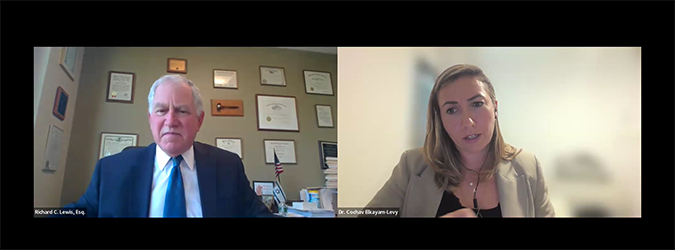Fighting for Human Rights in Iran: Pursuing Justice & Accountability
4.28.2023
The death of Kurdish-Iranian Mahsa Jina Amini while in custody of the Islamic Republic of Iran in September 2022, and the subsequent executions of protestors by the Islamic Republic, has brought renewed interest in human rights in Iran.
The International Section of the New York State Bar Association held the first of a two-part series to address recent developments in international human rights law in April. The speakers also addressed mechanisms for accountability for perpetrators of human rights crimes and justice for victims. In addition, the speakers presented recent actions taken by the United Nations to address these crimes, and steps that lawyers and members of the public can take to effect change.
Professor Azish Filabi, chair of the NYSBA International Section, who is of Iranian descent, opened the event with a short history of human rights abuse in Iran including current reports of extra judicial killings of protestors and poisoning girls attending school.
“This has become a women-led revolution. The protests have been unified around the concept of ‘women, life, freedom,’” she said.
Panelists Gissou Nia and Nushin Sarkarati focus on human rights in Iran in their work at the Strategic Litigation Project of the Rafik Hariri Center & Middle East Programs at the Atlantic Council.
Civil Litigation & Sanctions
There are several limitations to prosecuting war crimes in the United States. To pursue a civil case, a victim must be a U.S. national or of dual nationality when the abuse occurred. The accused perpetrators, often government leaders, must set foot in the U.S. to face charges, and trial by absentia is not an option in American courts. There is a movement in Congress to open the plaintiff class for torture cases, expanding the law to allow those who are U.S. nationals at the time they file a claim, not at the time of the torture, to pursue legal action. Nia says even if an Iranian leader visits the United Nations in New York, they are protected by diplomatic immunity.
Despite these barriers, Nushin says pursing litigation is still beneficial. “An indictment sends a strong message that the U.S. recognizes the human rights violations and publicly identifies the perpetrator. Even if the person does not come to the U.S. to face trial, an indictment can lead to an Interpol red notice, which will limit a person’s ability to travel,” Nushin says.
Nushin adds that coordination of sanctions between nations and the freezing of assets in the U.S. are additional tools that are not affected by diplomatic immunity. “There has been movement toward seizing assets, not just freezing them. It’s another punitive step against Iran that could make them take these sanctions seriously.”
United Nations Fact Finding Mission
After years of inaction, the United Nation recently created a UN Human Rights Council fact finding mission to Iran. The small team has a mandate to investigate human rights violations while collecting and preserving evidence of crimes. Its work is slated to end in March 2024 but many human rights groups are advocating for an extension to this deadline. According to the panel, the Islamic Republic is unmoved by international pressure to grant women’s rights. “The Islamic Republic is very proud of these laws. They are doubling down on this framework,” said Nia.
Supporting the MAHSA Act
Many attendees asked the panel how they can help this cause. Both panelists encouraged reaching out to members of Congress to pass the MAHSA Act. Introduced earlier this year, it mandates that President Joe Biden perform a review of targeted sanctions against Iran. Some leaders are only listed on the terror watch list and not as human rights violators. This review would add additional war crimes to the offenses for those leaders. The MAHSA Act would also open opportunities to civil litigation for victims and legal processes to freeze and potentially seize assets for the compensation of torture victims.
The MAHSA Act is still in the House Foreign Affairs Committee chaired by Michael McCaul of Texas. New York Congressman Mike Lawler from the Hudson Valley is also on the committee. Expressing support for the bipartisan bill can help move it out of committee to the House floor.
Both panelists encourage attorneys to seek out pro bono work in their communities by helping immigrants and those making humanitarian parole requests.
Part two of the Human Rights in Iran panels will take place this fall on the topic of universal jurisdiction and the implications of the Hamid Nouri trial in Sweden. Hamid Nouri is an Iranian official detained in Sweden and found guilty in connection with his actions as a key figure in the 1988 executions of Iranian political prisoners, a massacre of reportedly between 2,800 to 30,000 Iranians.






